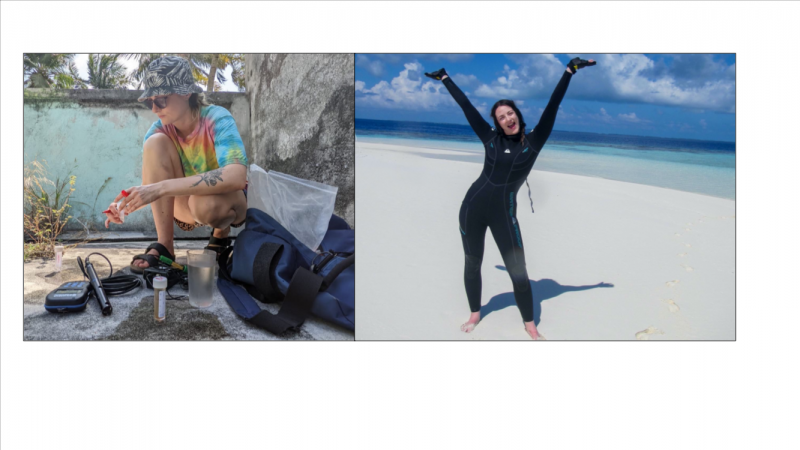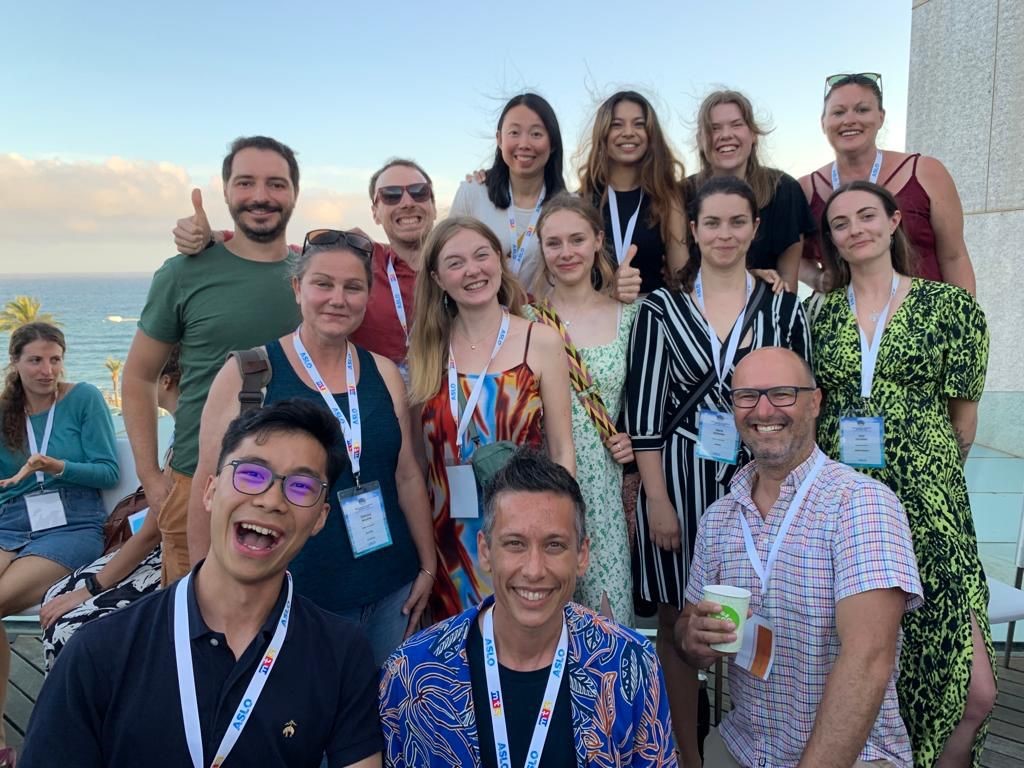The ASLO Aquatic Sciences Meeting 2023
Lucy Carruthers
Northumbria University

I was very honoured to be awarded the travel grant by The Challenger Society to attend the ASLO Aquatic Sciences Meeting 2023 in Palma, Majorca, which took place from the 4th to the 9th of June. This year’s theme was ‘Resilience and Recovery in Aquatic Systems’ and I was excited to engage in topics based on positivity and unity in the science community. This was my first ever conference, so I was really looking forward to all the new experiences I would have and the chance to meet new people in my field. Plus, spending a week in the sun on the stunning island of Majorca wasn’t so bad!
Caption: On my daily walk to the conference, I would take different routes and explore the sites of Palma along the way. Bottom right is me pointing at the Palma Convention Centre which is where the conference was held.
I was relieved to discover that my presentation was scheduled for the first day of the event. This meant that I didn't have to endure a long wait and could fully immerse myself in enjoying the remainder of the week once it was over. I was quite nervous for my presentation as I’m sure, like most people reading this, I find talking in public quite overwhelming. However, I saw it as an opportunity to challenge myself and conquer my fear, making it all the more significant. My presentation, entitled ‘Is sea level driving mangrove die-back in the Maldives? Insights from remote sensing and dendrogeochemistry’, was a chapter from my PhD thesis and project that I am deeply passionate about. I felt immensely grateful to have the chance to share it with an international audience during the ‘Extreme Climatic Events: A Challenge for Shallow Coastal Ecosystems’ session. Before my talk, I made the unfortunate mistake of drinking a few too many espressos which I thought would energise me in Spanish sun but, in fact, added to my adrenaline and nerves! Nevertheless, once I stepped onto the stage, I felt surprisingly at ease, and my presentation went exceptionally well. The overwhelmingly positive feedback I received took me by surprise. It was truly heart-warming to be part of such a supportive community, and I felt a genuine sense of pride in myself. This experience provided me with an incredible boost of confidence that carried me through the rest of the week.
Caption: Me on the big stage during my presentation and celebrating after with a large glass of well-deserved sangria!
I really enjoyed the broad range of sessions at the conference and spent the rest of the week going to as many as I could. Some favourites of mine were learning about all the different applications of remote sensing in aquatic research and sessions relating to blue carbon and natural infrastructure. In the spirit of broadening my knowledge and embracing new perspectives, I also made a point to attend sessions that were not directly related to my PhD research. One highlight was attending a captivating talk by John Dabiri, from the California Institute of Technology, whose work focuses using jellyfish to make discoveries in ocean monitoring, heart condition diagnosis, and wind turbine engineering. His ground-breaking research left me in awe and I’ll never look at jellyfish in the same way!
Beyond the scientific content, one of the standout moments for me from the conference was the incredible networking opportunities. ASLO hosted various mixers and poster sessions as well as a super fun closing ceremony which served as ideal platforms for networking and meeting fellow attendees. It was truly an awesome experience to meet and engage with fellow PhD students from various corners of the globe, exchanging insights and learning about their unique research journeys. I managed to meet up with the Barefoot Biogeochemistry research team from Southern Cross University, Australia and the University of Gothenburg, Sweden. I have been working with the Australian team for the past year, so it was great to meet up with the Swedish group and learn all about their research. Furthermore, I had the privilege of meeting professors who are actively involved in mangrove conservation and restoration projects. As a final year PhD student, these connections proved to be immensely valuable, enabling me to discuss future projects and career opportunities.
Caption: Me with the Barefoot Biogeochemistry team from Southern Cross University, Australia and the University of Gothenburg, Sweden lead by Professor Isaac Santos. It was great to finally be able to meet up with the Swedish team at ASLO. They’re a great bunch of scientists doing super cool research!
I came away from the conference feeling super inspired about my research and the new meaningful connections I have made as well as confident that the next public speaking I do will be a success too.
Profile:
I am Lucy Carruthers, a PhD student from Northumbria University, supervised by Dr Vasile Ersek and Dr Holly East. My research investigates the impact of climate change on the natural resources of coral reef islands in the Maldives, covering land, groundwater and mangroves.
Latest News
Marine Data Management, Governance and the MEDIN toolset
The Marine Environmental Data and Information Network (MEDIN) and OceanWise are delighted to invite you to attend our popular free online training workshop: ‘Marine Data Management, Governance and the MEDIN toolset’ on the 19th – 23rd of May 2025.
Workshop on the contribution of UK Arctic Ocean science to the International Polar Year 32/33
12:00 11th June – 16:00 12th June 2025: NOC Southampton (In-person with online option): Registration deadline 16th May
REGISTER HERE
Pre-meeting questionnaire (open to all)
The purpose of this workshop is for the UK Ocean Science community to discuss and then draft a prospectus document outlining the priority Arctic research questions the community would like to address during the run up to, throughout and beyond the International Polar Year 32/33. Additionally, to identify what unique strengths and technologies the UK has to help fill these knowledge gaps.
The second day of the workshop will be dedicated to writing groups, one for each of the priority research questions identified - from both the pre-meeting questionnaire (HERE) and day one discussion. By the end of the meeting, each group will have produced draft text and sourced supporting figures for the prospectus.
Post meeting, the draft will be opened for comments and suggestions from everyone, regardless of whether they were able to attend the workshop or not. It will then be shared with UK funders (UKRI, FCDO, DSIT, ARIA) and potential international programmes with whom we would like to collaborate (e.g. Arctic 2050, Norway). It will form a basis from which wider integration with terrestrial, atmospheric and cryosphere communities can be built, e.g. at the UK Arctic Science Meeting in September in Northumbria.
To ensure balanced community and ECR representation, and to ensure that the size of the writing groups is efficient and effective, if the number of registrations from individual institutes becomes overwhelming, we may contact individuals or teams and ask that each institute selects a smaller number of individuals to attend in-person. Please wait for confirmation of in-person attendance before finalising travel arrangements.
The workshop will be open to hybrid attendance and contributions on both days.
Challenger Society Council Position Vacancy
The Challenger Society for Marine Science (CSMS) are pleased to announce an exciting opportunity to support the next generation of ocean scientists and innovators. CSMS are looking for a new Council member to fill the Student Travel Awards and Stepping Stones Portfolio. The successful applicant will administer the travel and research grants available for Early Career Researchers.
The role involves:
- Receiving applications for the two schemes and responding to applicant inquiries
- Soliciting and compiling input from the rest of the Council for assessing the applications
- Communicating with successful and unsuccessful applicants for the two schemes
- Working with the Honorary Treasurer on allocating funds to successful applicants
- Following up with award winners on their reporting requirements
- Attending Council meetings four times a year (in person or online) and contributing to discussions and decision making for CSMS
The usual term for Council members is three years.
For more information about the CSMS Council, please follow this link: https://www.challenger-society.org.uk/The_Council
For more information about our Early Career Researcher grants and awards, please follow this link:
https://www.challenger-society.org.uk/Stepping_Stones
and
https://www.challenger-society.org.uk/Travel_awards
If you are interested in applying or have any questions regarding the role, please contact kathen@bas.ac.uk
